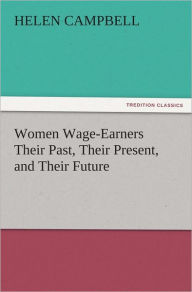Helen Campbell
Helen Stuart Campbell (pen names, Helen Weeks, Helen Campbell, Helen Wheaton; July 5, 1839 – July 22, 1918) was an American author, editor, social and industrial reformer, as well as a pioneer in the field of home economics. Her Household Economics
... Read more
Helen Stuart Campbell (pen names, Helen Weeks, Helen Campbell, Helen Wheaton; July 5, 1839 – July 22, 1918) was an American author, editor, social and industrial reformer, as well as a pioneer in the field of home economics. Her Household Economics (1897) was an early textbook in the field of domestic science.
Her first literary work was a series of stories for children, which appeared between 1864 and 1870 in Our Young Folks and The Riverside Magazine, and in book form as the Ainslee Series; then, in rapid succession, she published: His Grandmothers (1877); Six Sinners (1878); Unto the Third and Fourth Generation (1880); Four, and What They Did (1880); The Easiest Way in Housekeeping and Cooking; Adapted to Domestic Use or Study in Classes (1881); Patty Pearson's Boy: A Tale of Two Generations (1881); The Problem of the Poor: A Record of Quiet Work in Unquiet Places (1882); Under Green Apple Boughs (1882); The American Girl's Home-Book of Work and Play (1883); The Housekeeper's Year-Book (1888); Mrs. Herndon's Income (1883); The What-to-Do Club: A Story for Girls (1885); Miss Melinda's Opportunity (1886); Prisoners of Poverty: Women Wage-workers, their Trades and their Lives (1887 and 1893); Roger Berkeley's Probation (1888); Prisoners of Poverty Abroad (1888); Darkness and Daylight (1891); In Foreign Kitchens (1894); Some Passages in the Practice of Dr. Martha Scarborough (1895); and Household Economics (1897). At the turn of the century, she published, Ballantyne: a Novel (1901).
Helen Campbell Stuart was born in Lockport, New York to Jane E. (née Campbell) and Homer H. Stuart (died 1890). Both parents were Vermonters, of Scotch ancestry. The Stuart family, after settling in the United States, was prominent in early colonial affairs, three generations fighting and dying in Indian, French, and revolutionary wars. Homer removed, in 1839, to New York City, where he practiced law for over 50 years, being also for some years president of the Continental Bank Note Company, of New York.
She was educated in a school at Warren, Rhode Island, and at Mrs. Cook's seminary, Bloomington, New Jersey (1850–58).
At the age of 23, under her married name, Helen C. Weeks, she began work for children, writing steadily for Our Young Folks, the Riverside Magazine and other juvenile periodicals. Like all her subsequent work, these articles were vital, magnetic and infused with humor and pathos. Soon her stories grew in length, and the Ainslee Series was issued in book form. This comprised "Ainslee," "Grandpa's House," "Four and What They Did" and " White and Red." They were popular, and all of them were reprinted in England. Her next works were Six Sinners, His Grandmothers and The American Girl's Hand-book of Work and Play.
Less




























